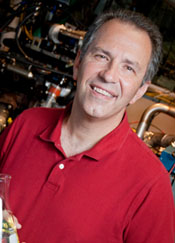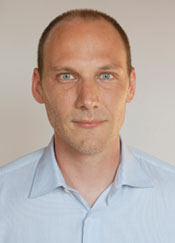
ANDRÉ BOEHMAN
André Boehman, a world leader in fuels and combustion research, is joining the U-M faculty as Professor of Mechanical Engineering. After receiving his PhD from Stanford and being a postdoc researcher at SRI International, Boehman started his academic career as an Assistant Professor of Fuel Science at the Pennsylvania State University in 1994. He was promoted to Associate Professor with tenure in 2000 and Professor in 2006. Over the years, Boehman has developed a very strong research program at Penn State and built an outstanding record of high impact journal publications in energy and fuels engineering. He is a recipient of the 2009 John Johnson Award for Outstanding Diesel Engine Research and the 2009 Arch Colwell Award from the Society of Automotive Engineers. He has also demonstrated excellent leadership in serving the professional community; serving as Editor in Chief for Fuel Processing Technology and holding executive committee positions in national and international organizations. Boehman is a Fellow of the Society of Automotive Engineers. “I’m looking forward to working with the talented faculty, researchers and students in the U-M Auto Lab,” Boehman said. “The ME Department is one of the premier departments in the country and does exceptional work in automotive engineering and many other areas.”

C. DAVID REMY
Remy joins the U-M as Assistant Professor of Mechanical Engineering. He earned his PhD from the Swiss Federal Institute of Technology and his master’s from the University of Wisconsin-Madison. His research is focused on the design, simulation and control of legged robots and other nonlinear systems. Specifically, he is interested in the effect and exploitation of natural dynamic motions, the role of different gaits and the possibility of force/torque controllable systems — both in conceptual models and hardware. Remy draws inspiration from nature, biology and biomechanics and works to build and control better performing robotic devices. By designing the mechanics in a “smart” way that can be exploited by the controller, the mechanical structure of the robot generates much of the required motion by itself and needs little input from the actuator. Ideally, these robots will be faster and more powerful, efficient and versatile. “I’m hoping for cross-fertilization,” he said, “where biomechanics helps robotics and robotics can help biomechanics, such as for physical rehabilitation,” he said. Remy is excited to be joining U-M. “The ME department is going beyond classic robotics, and the research here is already highly interdisciplinary,” he said. “There is research being conducted by a number of outstanding faculty that intersects nicely with my work. I’m looking forward to learning a lot — every single day.”